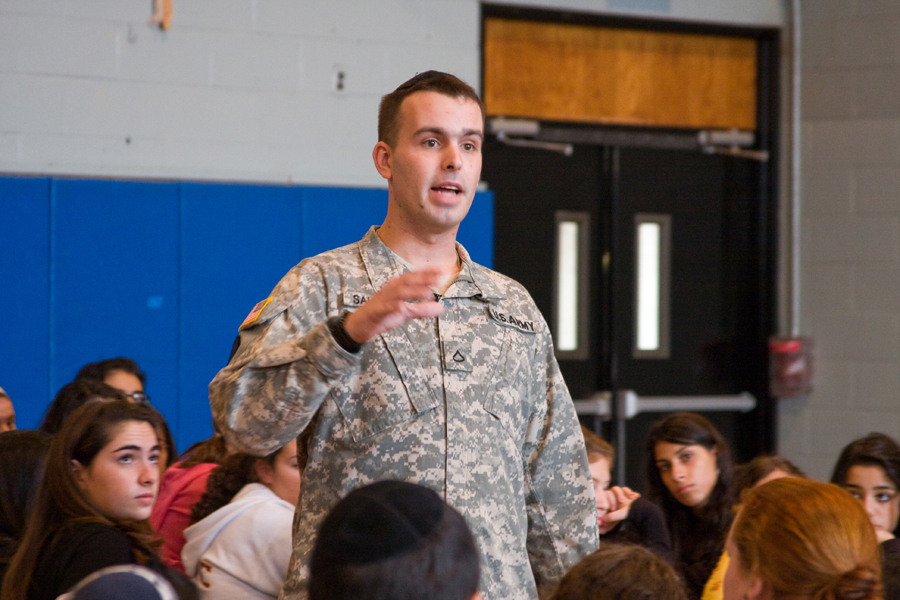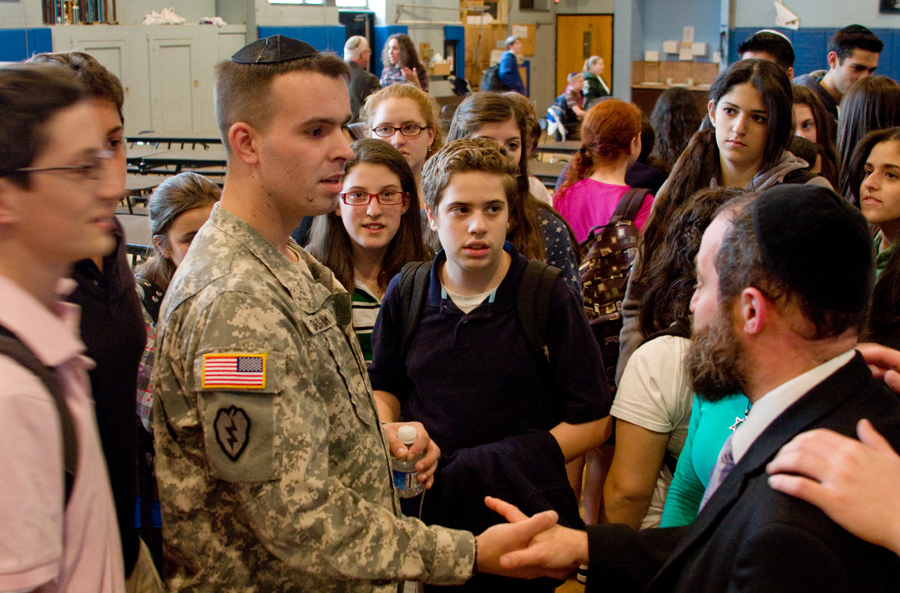Back from Iraq, HANC alum returns
Private Yosef Salzbank speaks about Jewish life in the army
By Michael Orbach
Issue of October 30 2009/ 12 Cheshvan 5770
An unusual alumnus returned to HANC High School this past Wednesday.
Private 1st Class Yosef Salzbank, a 2002 graduate who enlisted in the United States Army 18 months ago, gave a moving, often hilarious, talk about what it’s like to be an Orthodox Jew in the American military.
“Soldiers come from places where they’ve never seen a religious Jew,” Salzbank explained to the HANC students. “Each one of them meanders over to me individually and asks, ‘I don’t want to sound offensive, but what’s that on your head?’”
Three weeks ago, Salzbank said, one soldier thought his yarmulke was a bad toupee.
Rabbi Moshe Stavsky, the principal of HANC, introduced Salzbank by saying that as students graduate, “it is hard to say what you will become,” but that at HANC, “we hope to instill within you a desire to take the values [of the yeshiva] and bring them into your everyday life.”
Salzbank, Stavsky said, is an example of that. He is an intelligence analyst for the US Army, stationed at Fort Wainwright in Alaska; back from a tour of duty in Iraq, he is set to be deployed to Afghanistan in June. After graduating HANC, Salzbank studied at Yeshivat Ner Yaakov in Israel for a year before returning to the United States where he became an emergency medical technician. He continued his EMS education and became a paramedic, but found the job unsatisfying.
“I sacrificed from myself in order to make someone’s life better. I didn’t just want to do a job that just gave me a paycheck.”
He explained that he chose the US Army over the Israel Defense Force because he is an American and his family lives here; he also doesn’t speak Hebrew.
“I’d end up shooting the wrong guy,” he said with a laugh.
Life in the army is difficult as a religious Jew, Salzbank said, but he finds the experience completely worthwhile. Difficulties include keeping kosher and having Shabbos off, since Sunday is the regulation “free day.” To solve his kashruth problems, Salzbank has his own toaster and microwave. He uses a child-proof lock to prevent other soldiers from using it to warm non-kosher food. Salbank’s favorite appliance is his deep-fryer, he said.
He’s had to make sacrifices and while he’s aware of heterim (Halachic leniencies) for military service, he wishes he could be shomer Shabbos on “a consistent basis.” The closest Jewish community is a Chabad House 350 miles from Fort Wainwright in Anchorage. The military does allow him to go there on Shabbos.
In sharp contrast to an incident a little over a year ago where a soldier was prohibited from wearing a kippah in a military mess hall and assaulted because he was Jewish, Salzbank said his fellow soldiers are “enamored” with the idea of a religious Jewish soldier. Shul is called “Jew-church” and a number of weeks ago Trace Pallin, the son of the former Alaska governor, saw Salzback putting on tefillin and couldn’t understand why he was wrapping himself in electrical tape. Unlike his fellow soldiers, Salzbank said, he doesn’t go out to bars; he only goes out at 3 a.m. to pick others up when they’re too drunk to drive home.
“I am trying to set an example for Judaism, for Yiddishkeit, for our nation. I didn’t want to, but it fell on me,” he said.
Being a Jew in Iraq was not particularly difficult given that he wore a combat helmet over his yarmulke when out on patrol, Salzbank said. Interestingly, he got along well with the Iraqi Muslim guards on base. He described a running joke he had with two cafeteria guards: If they said hello first Salzbank would respond Alaikum Salaam, the standard return greeting in Arabic; if Salzbank managed to greet them first, they became the only Muslims in Iraq to wish Aleichem Sholom to a Jewish soldier.
Before a question and answer session, Salzbank preempted several likely questions by stating that, while he is classified as an expert marksman, he has never shot anyone. After all, he explained, he works in intelligence.
“I never shot at anyone, but I’m not going to tell you if I did or did not tell [the] commander to drop a big ol’ bomb on someone’s house,” he told the audience.
The students were uncommonly quiet for a high school throughout the presentation, save for a loud groan when it was announced that classes would resume after the speech.
Leon Vaknin, an eleventh grader, said he never would have thought it possible to be Orthodox in the military.
“Baruch Hashem, he’s fine and well,” he said about Salzbank, adding that he was now open to the idea of military service.
“I never thought it would be possible to be a Jew in the military,” said senior Eliana Kalaty, though she explained she’s not thinking about going to the military. Two of Salzbank’s cousins attend HANC, Lena and Jackie Salzbank, who said they tried to stay in touch with their cousin via Facebook during his deployment.
Salzbank is not the first HANC graduate to join the military. David Lazar joined an elite IDF combat unit last year and was sworn in at the Kotel.
Concluding his talk, Salzbank advised students, whenever they see a serviceman or woman in uniform, to shake their hand.
“They risk their lives in more ways than you know. It’s harder to leave your family than stop a bullet. For that, you should thank them.”

 48.0°,
Light Drizzle Fog/Mist
48.0°,
Light Drizzle Fog/Mist 







